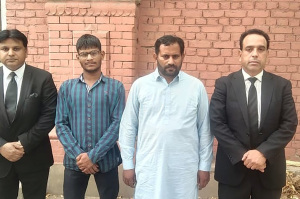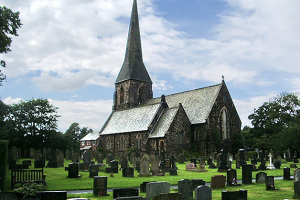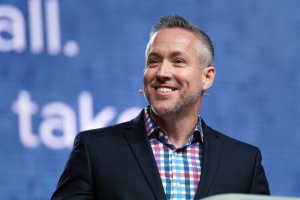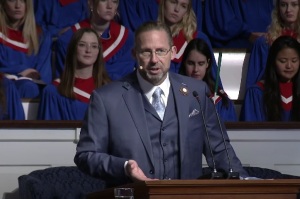‘Cowboy and Preacher’ movie aims to help Christians understand importance of saving environment

The filmmaker behind “Cowboy and Preacher” is hoping to make a compelling case for evangelical Christians to step up and take the lead in caring for the earth.
“Cowboy and Preacher” is set to be released on DVD/VOD, Sept 15. The film follows Christian pastor, cowboy and environmentalist Tri Robinson as he journeys to “discover why Evangelicals have abdicated their duty to be God’s stewards of this earth to the progressive left,” the film synopsis reads.
Robinson is the founding pastor of the Vineyard Boise. As a conservative Christian and a lifelong environmentalist, he offers seven Bible studies in the film which serves to show Christians why they are “mandated to care for this earth.”
His passion for caring for the environment comes from his western lifestyle, living on his ranch in Idaho. In the film, Robinson shows how the environment is inseparably linked to God.
The filmmakers believe that COVID-19 is also helping Christians and churches open their minds to helping the environment and getting back to nature.
View the premiere of the trailer here:
The following is an edited transcript of The Christian Post's interview with “Cowboy and Preacher” Director Will Fraser.
Christian Post: Tell us a bit about "Cowboy and Preacher?" How did you get to know Tri Robinson?
Fraser: I needed a subject for my film and so I searched for as many Christian environmentalists as I could. Tri Robinson was actually the first person I found. A Google search brought me to the Bill Moyers profile of Tri. I went through loads of other people but he always struck me as the best voice in this world, so I always came back to him. There are a lot of people who voice opinions but don’t actually do anything. Actions speak louder than words (particularly with anything to do with Christianity). Tri has done so much and is someone who continues to do things, from big picture world changing things to fixing all the little things on his ranch. He inspires me. Some documentarians make films about people they want to dethrone. I make films about people I think are cool. “Cowboy and Preacher” has always to me been a great collaboration with Tri to communicate a shared vision.
CP: Why do you feel that many Christians in America dismiss the call to care for the Earth?
Fraser: Many Christians make decisions about the importance of the environment for political reasons, but Christianity should go far beyond and above politics. Many Christians put their trust in leaders who are not worthy of them, and therefore become, though I hate to use the phrase, “useful idiots” in broader and darker political strategies. While trust in itself is often a good thing, the road to Hell is paved with good intentions, and some of the ways in which Christians position themselves at the moment, even if for sometimes good reasons, are not going to lead to a good place.
But conservatives can certainly bring environmental change. The most successful environmental legislation ever passed was the Montreal Protocol agreed in 1987 by conservative leaders such as Ronald Reagan and Margaret Thatcher. It phased out the use of CFCs, that were causing a hole in the ozone layer. These leaders identified a problem and solved it. Present day conservatives need to do the same thing.
From a Christian perspective, the Great Commission from Jesus is to spread the Gospel. But if Christians deny the importance of the destruction of the environment and the human suffering that will result from this, people will be driven away from Christianity. In other words, many Christians today are inverting and undermining the Great Commission. Do they really want to do this? It is easier to be against something than for something. It is easier to ignore or deny a massive problem such as global warming when the solution will have to involve some big changes to the comfortable way things are at the moment. But the good news is that Christianity provides a source of infinite strength for people who want to face the reality of trying to do as Jesus would do in this world.
CP: How did a filmmaker from the U.K. end up making a documentary about creation care in the U.S.?
Fraser: As a teenager, I always wanted to be a filmmaker and the films I loved most at that time were westerns — “The Wild Bunch,” “Once Upon a Time in the West,” "Pat Garrett and Billy the Kid." I started writing scripts at school and made short films at university. As soon as I graduated, I started to make films professionally. TV documentaries were the least difficult place to start and I discovered that I loved making documentaries.
My first doc was “Soul Searching for the Blues” (2001) that featured blues Hammond organ player Bruce Katz, made for various Canadian broadcasters. I was able to film in the Deep South. I’ve long been fascinated by America, particularly the atmospheric hinterlands. While making the film, I met someone and the next year went to visit her in Knoxville, Tennessee, and I discovered that she lived in a strange but compelling community where the seven houses were entirely made out of recycled materials, such as forklift truck pallets for shingles, or beer cooler doors for windows, and even half-trailers sawn in half and appended to Appalachian gothic turrets. Everything had been built by a carpenter called Rollo whose philosophy was that “we all have too much stuff and it’s killing the planet.” He would say: “Why work a job you don’t like to earn money to buy things you don’t need?”
I agree with that and made the film, “Once Upon a Time in Knoxville.” I thought it would change the world. Surely, everyone would be convinced by the need to scale down the economy to the point where it collapsed and life was totally basic and we could live in homes recycled out of all the rubbish our society has produced? It’s a compelling concept for me, but that film didn’t change the world, the reason being that it could only ever appeal to a small minority of extreme hippy environmentalists. The film preached to the choir. So I wanted to find out how to preach to the non-choir?
I went back to the drawing board, intent on making a film that really could bring change, and realized that the audience I needed to reach were the people who didn’t support any environmental action. The most influential of these people were Christians in America, who form a very powerful bloc. “Cowboy and Preacher” has been born out of my desire to reach this audience and the journey I have gone on as a result.





























